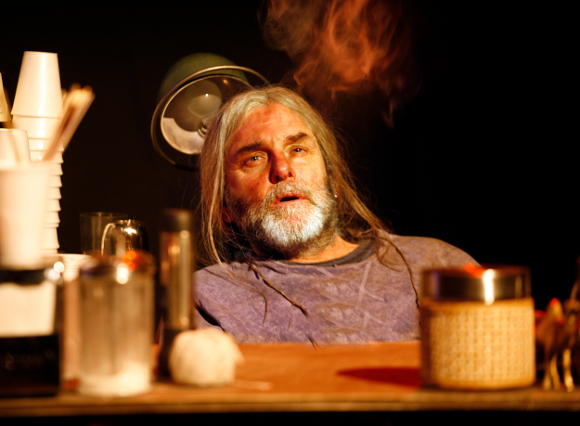Superior Donuts (Southwark Playhouse)

© Simon Annand
Killer Joe playwright Tracy Letts is represented at Southwark by a British premiere of a play dating from around the same time as his stage version of August:Osage County, the new Meryl Streep movie.
Ned Bennett‘s production lowdown on what’s going on in an uptown Chicago doughnut shop – failing business, a new recruit, a takeover threat, social unrest – may not be top drawer, but it honours a well-written, traditional "work and aspirations" play and has some pretty cool performances, though nothing to rival the incandescence of the Steppenwolf Chicago company that visited the National in August:Osage County (that memory is keeping me away from the movie).
The shop was opened by Arthur’s Polish father who dropped dead in 1970, four days after the Kent State University massacre; and Mitchell Mullen – bearing an uncanny resemblance to Richard Eyre as an ageing hippie vagrant – does a good job of transmitting the meaning of doughnuts in the historical context of protesting the Vietnam war. We are told (in the programme) that Americans consume ten billion doughnuts annually – 32 per person – and they have a national holiday devoted to them.
But Arthur’s an independent who resists change and plies his trade for the peace of his soul and the delight of his neighbours, not for big (Star)bucks; his regulars include a fat little Russian with "connections" (Nick Cavaliere); a docile bag lady who doesn’t pay (Amanda Walker); and a pair of cops, one of whom, Randy Osteen (Sarah Ball), is more than just watching out for Arthur.
In classic "rite of passage" style, the new boy, Franco, played with a fine intensity by Jonathan Livingstone, comes with new ideas about poetry readings, health food options and music in the kitchen. He’s also written a novel, needless to say, but is dogged by betting debts. The play gathers to a head when creditors come calling and the Russian’s intentions become clear.
Arthur has several philosophical monologues which define the cultural nexus of the play, and there are some lovely deft touches, such as when the black cop (Alexander James Simon), returning from a Star Trek convention, is recognised by Franco. "You know each other?" is the startled question. "All black people know each other," is the sardonic reply.
The play pulls of the difficult feat of being an historic state of the nation play in a small town setting, with well-conceived characters, and it’s a very good thing that producers Trick and Sarah Stribley have introduced us to an excellent play that travelled from Steppenwolf to Broadway; this interpretation, though, would have to go up a notch or several to warrant West End attention.










